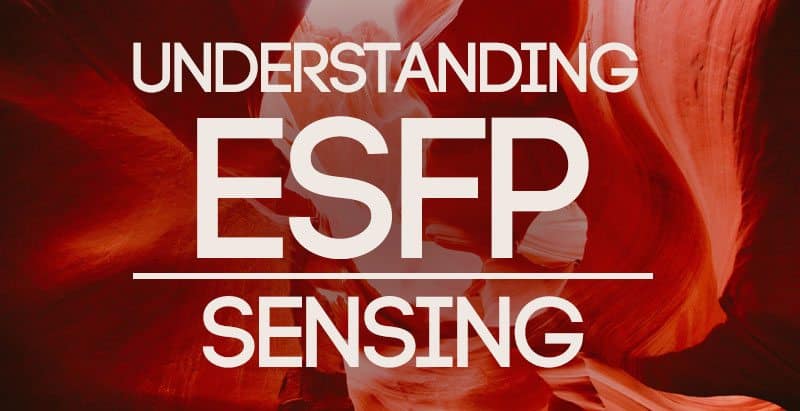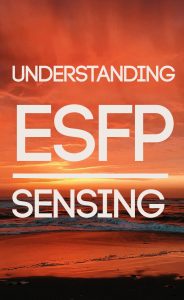Understanding ESFP Sensing
“You do indeed have a past, but not now! And, yes, you have a future, but not now! You can consume your now with thoughts of ‘then’ and ‘maybe’, but that will keep you from the inner peace you could experience.”
– Wayne Dyer, an ESFP
ESFPs have a special place in my heart. In fact, I would dare to say that they are one of the most underrated of all the personality types. I grew up with an ESFP mother who taught me that life was to be grasped and tasted and lived, who showed me how to ride shopping carts out of the grocery store and how to roller skate in the rain. She is intelligent, devoted, and a jack-of-all-trades. This is why it surprised me last night when I googled the words; “Are ESFPs”. What I saw was, “Are ESFPs stupid?”, “Are ESFPs annoying?”, “Are ESFPs shallow?”, or “Are ESFPs selfish?”. I don’t know if the people who google these things have never met an ESFP or if they just feel extremely superior, but all of the ESFPs I have known have been incredibly generous and creative individuals with numerous unique abilities and gifts.

ESFPs lead with dominant Extraverted Sensing (Se) followed up by Introverted Feeling (Fi). The way ESFPs use Se is what we are going to address in this article. We’ll get into their other cognitive functions in future posts.
Extraverted Sensing is what gives the ESFPs their ability to make the most of the present, to see opportunities quickly, to stay engaged with the world around them. These types are natural improvisers, opportunists, storytellers, entertainers, and humanitarians.
“Our diversity is beautiful – it would be so terribly boring if we were all the same! … Let’s love each other. … Let’s dare to be beautiful in our own truth – and still belong.”
– Desmond Tutu, an ESFP
Not sure what your personality type is? Take our new personality questionnaire here. Or you can take the official MBTI® here.
Understanding Extraverted Sensing
Extraverted Sensing is focused on discerning and being aware of everything happening in the present moment. ESFPs have a natural “kinesthetic intelligence” that makes them aware of how to use their bodies and environment in the most efficient, practical way possible. They often have a natural grace because they are so keenly aware of how to move and adapt to changes as they happen in real-time. They are quick to see opportunities to reach out to other people; whether it’s through providing practical help, telling a humorous story, or opening other people’s eyes to the natural beauty all around them.
Extraverted Sensing focuses on fully living in the moment. ESFPs know how to make the most of what “is” and how to adapt and create opportunities out of anything. They don’t feel the need to alter or change people, which gives them an open-minded, accepting demeanor. You can’t help but enjoy their company, and they make you see the beauty in each moment. They are experts at mindfulness, at seeing and appreciating the gifts of nature and the beauty in everyday life.
Extraverted Sensors are extremely realistic and down-to-earth, in fact, Carl Jung himself said, “No other human type can equal the extraverted sensation type in realism….this type is the lover of tangible reality..his lively capacity for enjoyment makes him very good company; he is usually a jolly fellow, and sometimes a refined aesthete.”
ESFPs trust reality, experience, facts, and what they can grasp through their senses. The result is that they are grounded in lived reality and can rapidly respond to what’s happening around them. They keep their feet firmly planted on the ground and enjoy improvising and adapting to ever-changing situations. In crisis situations where many other types might panic or retreat into their head to find solutions, ESFPs tend to respond rapidly. Each day is for seizing and this gives them a magnetic optimism that draws people in.
This isn’t to say that ESFPs are impossible to panic or that they never feel sad or depressed, but they do tend to have a natural ability to see the bright side. The saying “if life gives you lemons, make lemonade” captures the Extraverted Sensors adaptability and opportunism.
ESFPs are insatiably curious and they absorb an immense number of facts readily. They tend to be “jacks-of-all-trades” and are enthusiastic learners, ready to jump in and engage in any new project or opportunity. Isabel Briggs-Myers said in her book Gifts Differing, “Their (Se-users) enjoyment and absorption of facts is an essential function of a vigorous curiosity…Like other ES types, the ESTPs and ESFPs are curious about anything new.”
The curiosity of Se-users leads them to develop a plethora of skills. They can learn practically any hands-on trade, and they have a knack for figuring out how technical devices and tools work. Many ESFPs succeed as doctors, nurses, and even massage therapists because they are naturally in tune with the human body and are curious to discover how it works. They also are drawn to variety, and tend to have experience in a wide variety of fields. For example, one ESFP I knew could construct houses, sew, garden, cook, and he was a professional psychologist. My mother was a trained nurse, but she could also build, sew, teach, and she could sing almost anything beautifully. I could give countless examples of ESFPs who have numerous abilities, and I find it crazy that they are often so unappreciated in the personality type community.
The only areas that hold very little interest to most ESFPs have to do with theory and abstract topics. Until later in life, when ESFPs develop their inferior intuition, ESFPs may be easily bored by discussing these types of subjects.
ESFPs and Misunderstood Intelligence
ESFPs are one of the more underserved personalities when it comes to the world of education. The majority of elementary teachers are SJ types, who tend to teach through rote memorization, repetition, and lecture. The majority of university professors are intuitives, who like to focus on the abstract, the theoretical, and who may teach in a non-linear fashion. ESFPs are just as intelligent as SJs and intuitives, but they rarely meet teachers who share their preferences and tailor to their learning style.
“Traditional education is based on facts and figures and passing tests – not on a comprehension of the material and its application to your life.”
– Will Smith, a rumored ESFP
ESFPs learn best by doing. They want to get their hands on things, to interact, to work with people. They excel in fields that have a practical application and work best on their feet, moving and connecting with the world around them. Sitting still at a desk all day listening to lectures and repeating sums is frustrating for the majority of SP types. While they have the same mental abilities that other types do, they would be better served by actively engaging with the world, by moving while they learn, by using their kinesthetic intelligence to physically connect ideas and principles.
“School, I never truly got the knack of. I could never focus on things I didn’t want to learn.”
– Leonardo DiCaprio, a rumored ESFP
The MBTI® Manual says of ESFPs, “Because they learn more from doing than from studying or reading, they tend to plunge into things, learning as they go.” ESFPs tend to excel in fields where they can work with something or someone directly. Many ESFPs are highly creative; they usually enjoy the arts, acting, drawing, singing, entertaining. Michelangelo, Steven Spielberg, and even Beyonce are considered ESFPs.
The important thing for the ESFP in school is that they are taught something they see especially relevant. If they’re disinterested in a subject or don’t see how it will be important in their daily life, it becomes difficult for them to focus.
“Something stopped me in school a little bit. Anything that I’m not interested in, I can’t even feign interest.”
– Quentin Tarantino, a rumored ESFP
Dario Nardi, a UCLA professor and expert in the field of neuroscience said of ESPS that, “Because their neocortex is often ready for tactical action, the Se types are frequently bored. Quietly sitting in a classroom or office doing pencil-paper work is like a tennis player waiting endlessly on a court for a game with no opponent and no ball. It is no surprise that they are more engaged while moving.”
Characteristics of ESFPs:
– They are realistic and down-to-earth.
– They are practical.
– They tend to be optimists and opportunists.
– They are adaptable and easy-going.
– They like to collect interesting facts and are keenly aware of the details of their current environment.
– They learn best from experience and hands-on activities.
– They are authentic and honest.
– They are compassionate and giving.
– They are often physically aware and graceful.
– They are focused primarily on the moment and making the most of things as they are.
The Neuroscience of Extraverted Sensing:
UCLA professor Dario Nardi, says in his book The Neuroscience of Personality that Se-users show “a “tennis hop” brain pattern….all regions of the neocortex are low amplitude and out of synch….This state is very effective. A low amplitude requires little energy while the shifting frequencies allow the brain to quickly direct whichever regions are needed for a surprise, incoming task.”
Nardi goes on to say that this brain activity explains why ESFPs enjoy playing games that involve tactical action (like sports or Mario Cart). In fact, ESFPs enter a “zone”-like state when they are engaging in crisis situations. They become calm and focused, reacting quickly and logically to solve the problem.
Se-dominant individuals are able to quickly integrate physical and sensory information and are highly capable “at physical, concrete tasks, especially tactile and physical multitasking such as juggling even if they have not done a task before.”
There is a lot more information about the neuroscience of Extraverted Sensing in Dario Nardi’s book, Neuroscience of Personality: Brain Savvy Insights for All Types of People.
Some Fun Facts About ESFPs:
Facts are taken from the MBTI® Manual – Third Edition
– ESFPs are ranked second highest in satisfaction with “Marriage/intimate relationships.”
– Male ESFPs ranked highest on two out of three measures of creativity.
– ESFPs rank higher on deductive reasoning than dominant Thinking or Feeling types, with other dominant Sensing types.
– They prefer history among their academic subjects.
– In a national sample, ESFPs were among the top four types valuing “Home/family,” “Health,” “Friendships,” “Financial Security,” and “Spirituality.”
Have Any Questions?
Feel free to ask me in the comments!
Find out more about your personality type in our eBooks, Discovering You: Unlocking the Power of Personality Type or The INFJ – Understanding the Mystic. You can also connect with me via Facebook, Instagram, or Twitter!
Sources:
Want to know more about ESFPs? Check out these amazing books!
Gifts Differing: Understanding Personality Type
MBTI Manual: A Guide to the Development and Use of the Myers-Briggs Type Indicator, 3rd Edition
Neuroscience of Personality: Brain Savvy Insights for All Types of People
Creative You: Using Your Personality Type to Thrive
Psychological Types (The Collected Works of C. G. Jung, Vol. 6) (Bollingen Series XX)













Enjoyed the read. ESFP here who is learning about himself, and why I react to things the way I do. The part that is interesting me the most is how I’ve been able to have such a happy marriage to my intj wife.
I am also an ESFP and greatly appreciate reading something that points out the practicality, vibrancy and potential of Extroverted Sensation. As a prison therapist in an inpatient psychiatric unit, work is where I have a deeply satisfying opportunity to shine. Always being acutely aware of my surroundings while also being deeply focused and engaged with another person or group, is essential in artfully using my authentic self and purest intentions to truly empathize with and help heal some our society’s most pathological and complexly wounded human beings.
I believe that the combination Extroverted Sensation and Introverted Feeling drives this desire, passion and talent for me. Thanks for the article 🙂
I am also an ESFP and greatly appreciate reading something that points out the practicality, vibrancy and potential of Extroverted Sensation. As a prison therapist in an inpatient psychiatric unit, work is where I have a deeply satisfying opportunity to shine. Always being acutely aware of my surroundings while also being deeply focused and engaged with another person or group, is essential in artfully using my authentic self and purest intentions to truly empathize with and help heal some our society’s most pathological and complexly wounded human beings.
I believe that the combination Extroverted Sensation and Introverted Feeling drives this desire, passion and talent for me. Thanks for the article 🙂
It’s so great to hear from you! Thank you! I wish I would hear from more ESFPs here on the blog 🙂 It sounds like you are doing amazing and useful work and really utilizing your gifts as an ESFP 🙂 I bet you have a lot of wisdom and insight you could share on this blog if you’re interested in guest posting sometime!
Thank you! I have found so much value in understanding and exploring the personality types and thought processes of the people around me. I have sparked different levels of interest in almost everyone I know and am always looking for good materials to present to others about my own personality, but my particular type seems to have a thinner online presence. (I have a few theories about that.) So it was very refreshing to find your article.
Anything I can do to improve understanding of ESFPs would be great! I would certainly be interested in sharing how I see my cognitive functions shape my experience of life. Please let me know how we can talk more about that 🙂
This is amazing how this is right on and I didn’t know I had a specific personality. Now I know . Lol